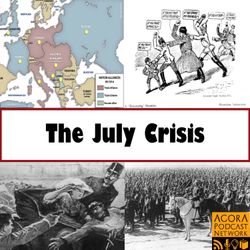Share

When Diplomacy Fails Podcast
1956: Conclusion
•
After nearly forty episodes, and many fantastic discoveries, what can we learn from this incredible year in history? Was it a turning point for the decolonising Europeans, or simply a signal that the United States was now the top dog? Was it truly damaging for the Soviets, or did the Hungarian chapter simply confirm what many had assumed - that only by forceful repression could the Warsaw Pact members be kept in line? This was a year of several spinning plates, but before we bid it farewell, we still have a bit more to say, so I hope you'll join me!
More episodes
View all episodes

Are the Sanctions Against Russia Working? - 'Punishing Putin' by Stephanie Baker
53:01|For two and a half years, Russia has been waging a full scale war against Ukraine. In response, the West has mobilised an economic coalition of states determined to level sanctions against the aggressor, ideally, to force it to the peace table. Clearly, Russia has not been deterred, but how much of an impact are the sanctions really having? In her book Punishing Putin, Stephanie Baker analyses the reality behind these measures, but also their sheer significance. Indeed, we have entered a new era of Russian relations with the west, and there is no going back.Thanksss to Stephanie for joining me, please show your support by getting your excellent new book here [Amazon], also available in your favourite book shop!
#33: 28 July 1914 II - Austria Declares War
49:19|After weeks of delay, hesitation and complications, Austria-Hungary finally delivered its declaration of war on Serbia shortly after noon on 28 July 1914.This, we are often told, represented the beginning of the First World War. But was it as straightforward as that? Contemporaries did not necessarily believe that all hope for peace had been lost. A degree of optimism remained, even in Berlin, where Russia's intervention was perceived possible, but not inevitable.Now that Austria had made its choice, what would Russia choose to do? As we see, Sazonov was depressed and angry by the Austrian act. In this cynical mood, he took several steps which were designed to ratchet up the pressure on Vienna to hold back, and on Berlin to persuade its ally to do so. And there was no guarantee that Austrian and Serbian forces would even meet on the field.Serbia had withdrawn its army to the interior, and Habsburg armies were only beginning to be mobilised. Another fortnight was required before the army would be ready, but where should this army go? Thanks to her poor infrastructure and woeful military durability, Austria found she had fewer options than expected once Russia refused to back down. The military and political aspects of her policy were thus intertwined, yet each was as badly understood as the other.As Germany urged Vienna to give it some indication of what it would do, and Britain pressed for direct Austro-Russian negotiations, the world continued to operate as if yet another crisis in the Balkans would work itself out. Had it not happened before? In fact, this time the crisis was different, and the potential consequences far more catastrophic.Support the July Crisis series, join the conversation, and find out more through these links:Do you want ad-free episodes with scripts attached, and bonus content? Support us on Patreon and you can suggest July Crisis episodes!Join our Facebook group as we make our way through this fascinating series!Click here to see our July Crisis workspace in Perlego, you'll find every source you need!
#32: 28 July 1914 I - The Kaiser's Conundrum
50:07|The 28 July 1914 is best remembered today as the point of no return, as Austria declared war on Serbia.However, as we will see in this episode, the announcement of this Austro-Serb war, made in the afternoon, and reaching Europe's capitals by the evening, did not ruin the prospects for peace as we might expect. Many contemporaries still believed that it was possible to preserve peace, and foremost among these was Kaiser Wilhelm II. Weeks before, he had given the green light to the blank cheque, but on this morning, Wilhelm finally read Serbia's reply to Austria's ultimatum, and in his view, all reasons for war were now gone.Wilhelm now proposed a way out of the crisis - Austria would occupy Belgrade, in lieu of Serbia's commitment to dismantle the Pan Serb propaganda and fulfil Austria's remaining demands. This was the Halt in Belgrade, and it was to have a short, but fascinating shelf life, while experiencing several ups and downs before it was eventually killed. In this episode, we trace this idea, and why some in the German government worked hard to push for it, while their colleagues worked to undermine them. The German policy was confused, but also impatient. German Chancellor Bethmann Hollweg was running out of patience with his Austrian ally, and in his view, Vienna needed to be given a stark warning. She must make amends with Italy, and present her war plan to her ally - did she want to annex Serbia, or not? It was vital that these questions were clarified, as it would make all the difference when dealing with Serbia's protector, Russia. Could Germany stop the ball rolling, or were their efforts, like so many others, hampered by delusions, misinformation, and mistrust? Find out as we begin our coverage of this watershed moment in our history.Support the July Crisis series, join the conversation, and find out more through these links:Do you want ad-free episodes with scripts attached, and bonus content? Support us on Patreon and you can suggest July Crisis episodes!Join our Facebook group as we make our way through this fascinating series!Click here to see our July Crisis workspace in Perlego, you'll find every source you need!
#31: 27 July 1914 II - Don't Stop Me Now!
44:05|On this otherwise unassuming Monday in 1914, Austria-Hungary was preparing to declare war on Serbia.The declaration would come the following day, but in the meantime, Germany assisted Austria in keeping up appearances. Those tenacious Brits were at it again, and Grey's mediation proposal still hung in the air. Could a rejection of this scheme worsen the crisis? Perhaps, so it was necessary to tread carefully. The mediation idea would be passed onto Vienna, albeit without much enthusiasm, and Austria could maintain its image as the power in search of justice. But other concerns were rising to the surface. The Russians were furthering their mobilisation efforts, and looked determined to continue their pressure campaign against Austria. But still, an optimistic view of Russian intervention reigned in Vienna, which stressed that the Tsar would bark but not bite. All evidence to the contrary was ignored, and encouraged but not directed by Berlin, Austria prepared to cut through all this mediation noise, and shatter the expectations of contemporaries with a declaration of war. No one could stop her now.Support the July Crisis series, join the conversation, and find out more through these links:Do you want ad-free episodes with scripts attached, and bonus content? Support us on Patreon and you can suggest July Crisis episodes!Join our Facebook group as we make our way through this fascinating series!Click here to see our July Crisis workspace in Perlego, you'll find every source you need!
#30: 27 July 1914 I - Britain Tries Diplomacy
01:11:06|In this enormous episode, we examine the largely forgotten story of British efforts to resolve the crisis, and efforts at home to prepare the people for what might come next.Although Austria's ultimatum had expired two days before, there was still room for diplomacy to work, and Sir Edward Grey was determined to give it his best shot. To preserve peace, Grey pressed his conference scheme to the European courts. When this was rejected, he modified his approach, and accepted other suggestions like bilateral Austro-Russian negotiations. Telegrams pinged back to London, reporting on the deteriorating situation, yet Grey held firm to the principle that Britain should not declare itself. She had more leverage, he believed, if she maintained her 'free hand.'In his very short address to the Commons, Grey alluded to the conference scheme, and stressed the government's commitment to peace, as well as its freedom of action. Yet, he did not reject claims made by The Times and other papers, which emphasised Britain's ties to its friends, and the duty this entailed. He also remained quiet about the elephant in the room - Britain was tied to France, and military discussions between them had secretly bound Britain to French war calculations. This Grey wisely kept quiet from the Cabinet, as a split was inevitable if he did not tread lightly.This is exactly the kind of deep dive analysis which this podcast is all about, and I can only thank you so much for making it possible!Support the July Crisis series, join the conversation, and find out more through these links:Do you want ad-free episodes with scripts attached, and bonus content? Support us on Patreon and you can suggest July Crisis episodes!Join our Facebook group as we make our way through this fascinating series!Click here to see our July Crisis workspace in Perlego, you'll find every source you need!
#29: 26 July 1914 II - Better an End in Horror
36:50|If Austria-Hungary wanted the war with Serbia, it would have to get its skates on. Europe was eagerly looking for any sign of a way out, even if Austria was not.The British were central in pressing the need for mediation, but they knew that Germany's inclusion was key if it was to work. The Germans, it was reported, anticipated British neutrality. This was wrong, it was insisted, because Britain would tend to her interests. Even more, Britain had kept its fleet, mobilised through annual manoeuvres, intact as the crisis escalated. Did this not prove Britain's seriousness?Whether Britain was sincere or not, it mattered less than what Austria did. By now it was widely known that Austrian armies were not marching, and if the rumours were true, and she could not march until 12 August, then that gave plenty of time for things to blow over. But before Sir Edward Grey could put the finishing touches on another Balkan conference, he first had to ensure German support, and this was proving impossible to obtain.The German imperative of supporting Vienna in its swift Serbian war remained in play, even if Austria had not moved. Mediation would threaten this goal, and it had to be countered. Besides, reports from Russia were beginning to make Berlin nervous. Increased military preparations could ruin Germany's own strategic plans, so more information was vital. Just then it was learned that the Kaiser and his Chancellor were returning to Berlin.Could they persuade Austria to move? If not, could they persuade her statesmen to participate in diplomatic efforts? Berlin did not want a conference, but neither she nor Austria wanted war with Russia either. Could Russia not stay in her lane and ignore the attack on Serbia, especially after all the Serbs had done? The fatalist Austrian view asserted that whatever the consequences, Serbia had to be destroyed. It might be disastrous for the Habsburgs, but as the saying went, it was better to endure an end in horror, than a horror without end. Support the July Crisis series, join the conversation, and find out more through these links:Do you want ad-free episodes with scripts attached, and bonus content? Support us on Patreon and you can suggest July Crisis episodes!Join our Facebook group as we make our way through this fascinating series!Click here to see our July Crisis workspace in Perlego, you'll find every source you need!
Age of Bismarck - Introduction
29:59|It's been a long time coming! The Age of Bismarck is finally here after so many years of planning, teasing, and dreaming. Tune in here to see how we plan to do it, and why you should be excited! Whether you're a long time history friend or just stopping by, Otto von Bismarck's life and times, and the age in which he lived, deserves your attention. The Iron Chancellor would accept nothing less!Sign up on Patreon so you don't miss the first episode next week!Thanksss so much to all of you that made this possible.
#28: 26 July 1914 I - Austria Delays Again
35:06|The ultimatum had expired, and yet somehow, Austria had not declared war on Serbia. What was going on?Well, despite pushing the crisis forward with reckless abandon, the Austrian chief of staff Conrad von Hotzendorff now seemed awake to the dangers facing the country. The army would not be ready for war until 12 August, he said. This was a shock to the Germans, who continued to expect a lightning Austrian strike at Belgrade. But it did give the diplomats time to do their work.From Britain, Sir Edward Grey believed a mediation scheme involving four uninvolved powers was the answer. He encouraged Berlin to push this idea, and the Germans did so, but only reluctantly, and out of fear of offending Britain if they did not. But the question of Russia was arguably the most important of all, and the Tsar was apparently now willing to exercise his military muscle by approving the period preparatory to war, and the mobilisation of key military districts.This should have shown Austria that Russian intervention was highly likely, yet her statesmen continued to forge ahead. They had lost the diplomatic initiative, and they had failed to present Europe with a fait accompli. Instead, the sluggish, conditional Austrian response seemed ideally suited to diplomatic mediation. But would Austria take the easy way out? Incredibly, from Vienna, the answer was still no.Support the July Crisis series, join the conversation, and find out more through these links:Do you want ad-free episodes with scripts attached, and bonus content? Support us on Patreon and you can suggest July Crisis episodes!Join our Facebook group as we make our way through this fascinating series!Click here to see our July Crisis workspace in Perlego, you'll find every source you need!
#27: 25 July 1914 II - Russian to Mobilise
45:02|Here we address the question - now that Austria's ultimatum to Serbia had expired, and the Austrians had evacuated Belgrade, what was Russia going to do about it?The answer is as complicated as it is controversial. Russia's response revolved around military preparations; specifically, those preparations which would make the mobilisation of its enormous army across such a vast empire easier to carry out. These measures were called the Period Preparatory to War, and on this day, these measures were officially approved by the Tsar and his Ministers. What did this mean? Was the Period Preparatory to War simply mobilisation under a different name, or was it a reasonable response to the crisis, which merely granted Russia more diplomatic leeway?Unsurprisingly, the answer is contentious. To some, this was the key aggravating factor which transformed the July Crisis from a regional dispute into the world war it became. To others, Russia's preparations may have been inflammatory, but they were not necessarily sinister. Should we take these measures as proof of Russia's intention to orchestrate a world war on favourable terms to themselves? Perhaps we should not go so far, but one thing is certain, by the end of the day, a line had been crossed in St Petersburg.Once more details leaked out, Austria and Germany were bound to take notice. The question then became - would the Central Powers be scared off, or would they up the ante, seeing in Russia's behaviour yet another bluff which had to be called? Could anyone stop this game of chicken? In fact the Russians were not the only actors willing to be economical with the truth. Another was the French ambassador, Paleologue, and the Austrian Foreign Minister, Berchtold, as well as many German officials, determined to have their localised war and firm in the belief that Russia would back down.In this episode, we wade through this soup of contradictions, poor communications, mistrust and misinformation, to arrive at some worrying conclusions. Whoever we might claim was responsible, Europe was entering the twilight period of peace, whether contemporaries wished to acknowledge it or not.Support the July Crisis series, join the conversation, and find out more through these links:Do you want ad-free episodes with scripts attached, and bonus content? Support us on Patreon and you can suggest July Crisis episodes!Join our Facebook group as we make our way through this fascinating series!Click here to see our July Crisis workspace in Perlego, you'll find every source you need!